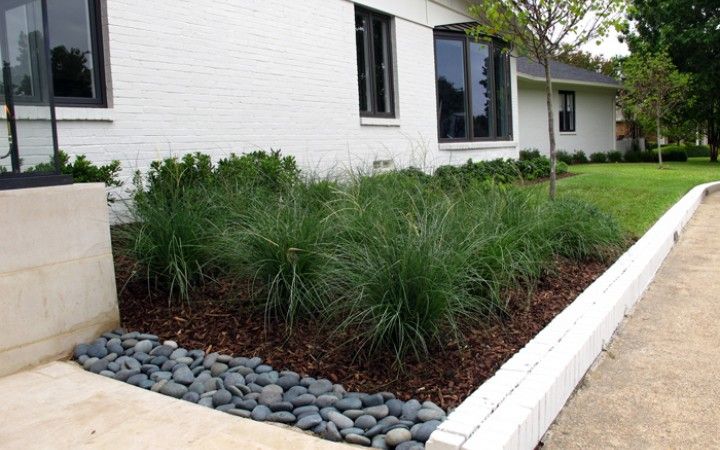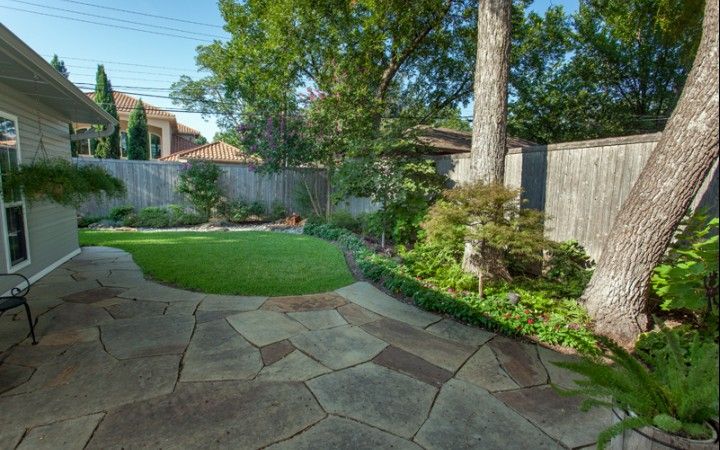New to Texas? 7 Tips for Smart Summer Watering
June 13, 2017 | By webadmin
Summer doesn’t officially arrive for another two weeks, but we’re already feeling the heat. Here in Texas, our weather tends to swing between the extremes; we can have ice in winter and drought with heat waves in summer. These extreme swings can really keep you on your toes when it comes to keeping your lawn and landscaping healthy and attractive.
If you’ve moved here from a wetter part of the country, you may not be used to providing the type of supplemental watering that is required here - in conjunction with strong water restrictions. If you’re not accustomed to drought conditions, we’re here to guide you through summer watering needs.

Mulch keeps moisture in the soil longer during hot months; ornamental grasses are excellent waterwise plants for Texas.
Tip 1: Hydrozone your Landscape: Hydrozoning your landscape means grouping plants with similar water needs in the same area of the landscape so none receive too much or too little because of their neighboring plants.
Tip 2: Established landscapes typically require the equivalent of one-inch of rainwater per week; from either rain or a sprinkler system. You’ll find that many healthy established plants and natives can tolerate a bit less water, depending on the time of year and their overall. Some plants can even go into a temporary dormancy to conserve resources during times of drought. This 1-inch per week watering recommendation is simply a general goal for keeping plants strong and looking their best.
Tip 3: Water for longer durations, fewer times per week. Shallow, frequent waterings can do a lot of long-term damage to your lawn, shrubs, and trees. Watering 3 or 4 times per week for say, 10 minutes, will encourage shallow and weak root systems close to the soil surface. You’re better off watering once per week, for long enough to deliver the equivalent of 1-inch of rainfall.

Hydrozoning: Putting plants in the right place with other like plants ensures each zone of plants gets the water they need.
Tip 4: The Cycle & Soak method is used to ensure better water absorption and reduce runoff by watering a short period of time, multiple times during the day. If you find your landscape can’t absorb a long enough watering cycle in one dose, you can split up the watering time on the same day using an A and B cycle on your irrigation clock - two start times. The idea is to run each zone for about ½ the necessary time and allowing it to soak in before delivering the second ½ of the watering, either after the first cycle has completed or a bit later. This method reduces water runoff, especially on sloped areas or areas of heavily compacted soil.
Tip 5: Give Each Plant What it Needs. Established plants with larger root systems can go a bit longer between waterings. Newly planted trees, shrubs, and perennials will need more frequent watering, especially throughout their first year in the ground. Larger trees will need special care for about three years. Containers plantings may need daily watering, and seasonal color plantings will probably need an additional watering per week.
Tip 6: Have your irrigation system audited. We recommend an irrigation audit once a year, usually before summer heat kicks in. A well-running system will better be able to protect plants from drying out, plus you’ll catch leaks or pressure problems that are wasting water.
Tip 7: Water Smart with a Smart Controller. Smart controllers can be added to your existing system, or added in with a new system, and controlled from your smart phone. Smart Controllers take into account the local weather and soil conditions, as well as the types of plants you have in each zone. Smart controllers help you keep your plants healthy and reduce water waste. Plus, you can control your system even if you’re on vacation cross-country.
Tip 6: Keep up with our blog. We post often about how to water during each extreme season we experience. And this summer, we’ll have even more tips to keep plants watered well. We even have a certified irrigation specialist in case your system needs repairs, an audit or adjustments.
